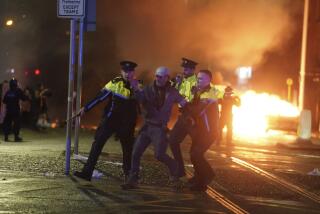Irish Leader Warns IRA Against Rejecting Peace Plan : N. Ireland: Prime minister says Dublin would join London in crackdown. Hours later, a bomb explodes.
- Share via
LONDON — Ireland will order tougher measures against the IRA if the outlawed group rejects a British-Irish peace plan and resumes full-scale violence, the republic’s prime minister warned Sunday.
Within hours of Prime Minister Albert Reynolds’ remarks, the Irish Republican Army triggered its first major bomb since the British-Irish peace offer.
The blast in Londonderry, Northern Ireland, narrowly missed a passing army patrol and a civilian car carrying two adults and three children. There were no injuries, but police said the five people in the car were treated for shock at a hospital after the 500-pound bomb exploded.
Also Sunday, suspected IRA warnings of bombs in London railway and subway stations brought hundreds of trains to a halt. A daylong search on about 20 miles of track turned up no bombs, police said.
Reynolds and John Major, Britain’s prime minister, last Wednesday agreed on a broad package of principles aimed at bringing peace to British-ruled Northern Ireland after 25 years of violence. They offered Sinn Fein, the IRA’s legal political allies, a place in negotiations if the IRA stopped killing.
“If they say no . . . undoubtedly there will be a stiffer security situation,” Reynolds said in an interview Sunday with the British Broadcasting Corp. “Both governments would be expected to respond,” he added.
Reynolds indicated that the British and Irish governments may reward the IRA with amnesties for jailed members if the IRA joins in peace talks on Northern Ireland.
Ireland would also lift a ban on broadcast interviews with members of the IRA and Sinn Fein, he said.
Reynolds did not say what he would do if the IRA rejects the plan. One step could be to clamp down on IRA members who operate from the Irish Republic.
The Roman Catholic-based IRA has used violence in its effort to end British rule in Northern Ireland, which then could join the predominantly Catholic Irish Republic.
Major reiterated that London would not abandon the province’s pro-British Protestant majority and would support its right to remain British.
“Joint (British-Irish) authority was not suggested,” Major wrote in Sunday Life, a newspaper in the Northern Ireland capital of Belfast, in a front-page appeal to the 1 1/2 million residents of the province, also known as Ulster.
IRA commanders reportedly started talks over the weekend about the Major-Reynolds plan.
The plan provides for the IRA and Sinn Fein to join exploratory talks with the British and Irish governments and other Northern Ireland parties within three months of declaring a cease-fire.
The British-Irish declaration envisaged the possibility of a united Ireland, but said Northern Ireland’s Protestants would have to agree.
Sinn Fein said it would talk to Protestant and Catholic church leaders, who back the plan. But Sinn Fein leader Gerry Adams, writing in Dublin’s Sunday Tribune, said it was up to Britain to persuade the Protestants to go along.
Adams met Sunday with John Hume, leader of the province’s Catholic-based Social Democratic and Labor Party. Hume said he came away convinced that “we will continue our commitment to the peace process.”
The SDLP wants Irish unity but opposes IRA violence, and attracts twice as many votes from the province’s Catholics as Sinn Fein.
Adams poured cold water on early hopes of an extensive IRA cease-fire.
The IRA is expected to announce a three-day cease-fire Christmas Eve, as it has since 1990. Influential IRA members serving prison sentences will be out on a seven-day holiday parole that week.
Adams said he would not be pressured into concessions by “hype” surrounding the Major-Reynolds formula. “Every such initiative is presented as the last great opportunity,” he wrote in the Sunday Tribune.
More to Read
Sign up for Essential California
The most important California stories and recommendations in your inbox every morning.
You may occasionally receive promotional content from the Los Angeles Times.













